Clinical trial for tawa-tawa vs mild COVID ‘nearing completion’
By ANTONIO G. PAPA, Ph.D.
Herbnext Laboratories, Inc. is located at Km 11 Negros South Road, Bago City in Negros Occidental.
The owner, Philip S. Cruz, is the president and chief executive officer of Herbnext Laboratories, Incorporated (HLI). He initially took up Bachelor of Science in Agriculture from UP Los Baños in Laguna but later transferred to UP Diliman (UP-D) where he finished his Bachelor of Science in Fisheries major in Aquaculture in 1985, and in 1988, he graduated with the degree of Master of Science in Fisheries major in Aquaculture at UP in the Visayas (UP-V).
His interest in science and his considerable scientific knowledge led him to establishing HLI. “Our company operates the first good manufacturing practices (GMPs)-accredited and HACCP-certified processing plant in Western Visayas,” Cruz opined.
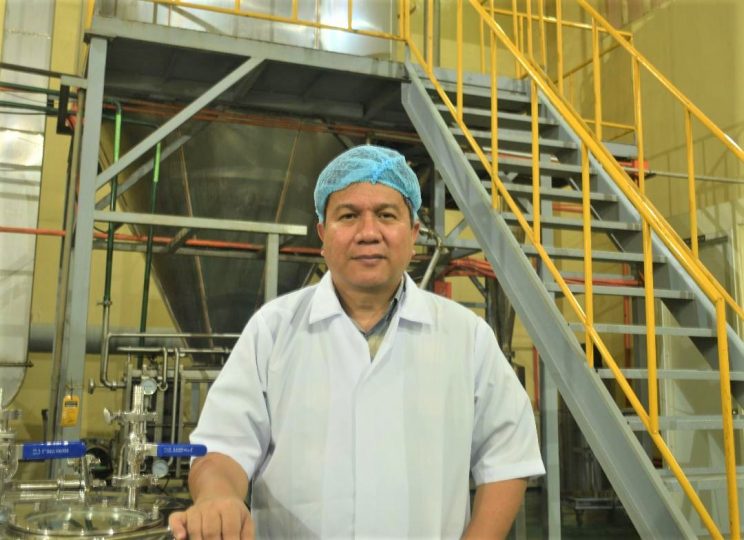 Philip S. Cruz, president and CEO of Herbanext Laboratories, Inc.
Philip S. Cruz, president and CEO of Herbanext Laboratories, Inc.
It engaged in research and manufacturing of natural products for health and wellness products. “Our product lines include herbal capsules/tablets, herbal syrups, powdered beverages, herbal teas, functional snack foods, sprayed-dried herbal extracts, powdered herbs, and essential oils.” added Cruz.
Likewise, Cruz is the President and General Manager of an aquaculture company in the region engaged in the manufacture of fish feeding equipment and in its consultancy services.
Cruz does research in phyto-chemistry, ethnobotany, as well as aquaculture. Their group’s most recent publication is ‘Citrus microcarpa EO loaded Niosomes: Preparation, Characterization,and Cytotoxicity on MCF7 cells’. Cruz is also currently involved in the standardization and dosage formulation of several Philippine medicinal herbs as well as in the production of starch-based tablet excipients.
Humble beginnings
The idea of establishing the laboratory started in 1995 when Cruz started his research interest into natural health products to find natural cure for a health problem. Thus, he studied the medicinal components of mushroom, scientifically known as Ganoderma lucidum, the “King of Herbs” in traditional Chinese medicine.
In 1997, he succeeded in mushroom culture and he collaborated with natural product researchers and medical practitioners in developing mushroom into a nutraceutical product. In 2001, HLI was finally established.
According to Cruz, “during our early years of operation, we focused on the production of mushroom-based herbal formulations for addressing common lifestyle health issues in the Philippines such as diabetes, high cholesterol, and hypertension.”
Through the assistance of the Department of Science and Technology (DOST), the company started its acquisition of advanced manufacturing equipment in 2006. In the same year, “we registered the Daily Apple Distributions as our marketing arm under the Daily Apple brand at the Department of Trade and Industry,” Cruz opined. “Since then, we broadened our product range to include nutraceutical, healthy beverages, and functional foods –– all utilizing our locally grown medicinal herbs.”
Herbanext farms
“We have our own organically certified grow-out farm. It is located within 10 minutes’ drive from our manufacturing plant,” Cruz explained. “We are successful in planting and processing around 20 different medicinal herbs including: banaba (Lagerstroemia speciosa), bitter gourd or ampalaya (Momordica charantia), cat’s whisker (Orthosiphon stamineus), five-leaved chaste tree (Vitex negundo), Ginger (Zingiber officinale), green chiretta (Andrographis paniculata), roselle (Hibiscus sabdariffa), wild tea (Ehretia microphylla), and turmeric (Curcuma longa), among others.
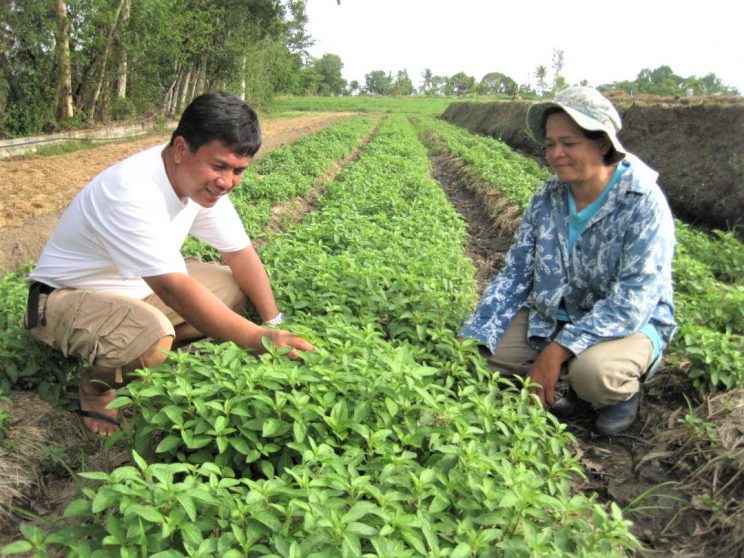 Portion of Herbanext herbal and medicinal plantations
Portion of Herbanext herbal and medicinal plantations
“Closely located to the plant is the company’s research and development (R&D) farm, which houses a raw material processing center. We also maintain the Herbanext Botanical Garden with a collection of more than 200 medicinal and aromatic plants which we also avail for students’ research,” says Cruz.
“At present, we are working closely with the DOST and other research institutions in developing Philippine medicinal herbs into herbal supplements and herbal drugs for the local and export markets,” adds Cruz. “One of our products is herbal tawa-tawa capsule––herbal supplement for dengue. Tawa-tawa or gatas-gatas, which is known to have antiviral and anti-thrombocytopenic (platelet increasing activity).”
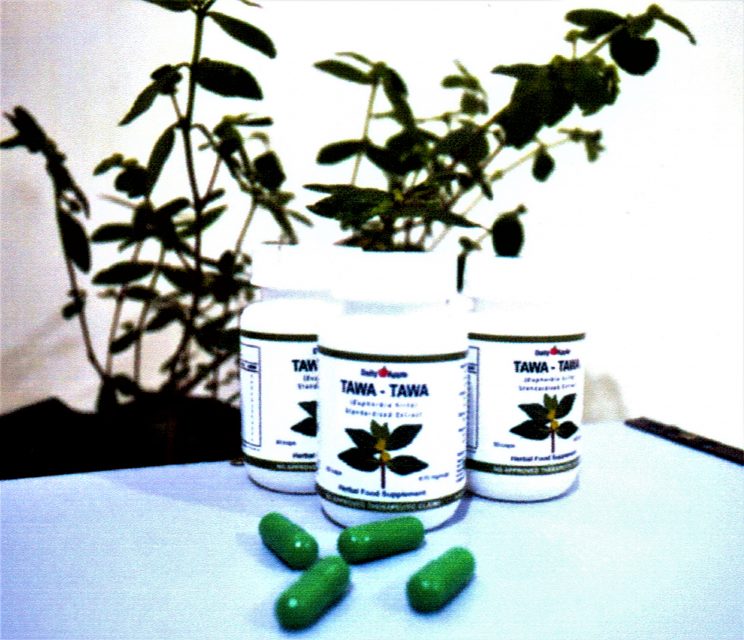 Tawa-tawa as dengue intervention
Tawa-tawa as dengue intervention
The problem: dengue is one of the major health problems in the country. According to the World Health Organization, a total of 71,785 cases of dengue and 277 dengue-caused deaths have been reported in the Philippines from January 1 until Oct 17, 2021this year. While there is no available specific treatment for dengue, there is a need for safe and scientifically-tested interventions that can help reduce the symptoms of dengue among infected patients.
A solution: in Philippine folkloric medicine, a decoction of tawa-tawa (Euphorbia hirta Linn.) leaves is commonly used as treatment for dengue. Scientific studies have shown that tawa-tawa is rich in bioactive compounds like phenolics and flavonoids which may be responsible for its anti-dengue properties.
Tawa-tawa capsule and its packaging by the Herbanext Laboratories,
Incorporated.
Researchers from HLI have dedicated over five years of research to study these bioactive compounds. This led to the formulation of a standardized spray-dried tawa-tawa extract which was later on packaged in capsule form.
Herbanext Laboratories Incorporated’s Tawa-tawa capsule is an herbal supplement that was developed through the funding assistance provided by the Department of Science and Technology (DOST) and Philippine Council for Health Research and Development (PCHRD) under the Tuklas Lunas® Program. This is an FDA-approved non-toxic formulation that is already available in the market. This herbal supplement claims no therapeutic properties but results of antithrombocytopenic studies provide evidence that it may help alleviate or reduce the symptoms of dengue. Said studies have shown that HLI’s standardized tawa-tawa extract has significantly increased platelet count of Sprague-Dawley rats after five days of treatment.
The tawa-tawa herbal supplement is already at Technology Readiness Level 9 (TRL 9). This herbal supplement is already available in the market. HLI is planning to conduct clinical studies to develop this supplement into a drug that will be used as a complementary treatment for dengue.
Business and research strategy
According to Cruz, ”Going into commercialization teaches one to appreciate business better and helps provide better guidance on the commercial relevance and viability of our research.”
He added that, “As far as Philippine natural products are concerned, major obstacles to development are the1) low adoption of technology, 2) undeveloped supply chain of raw materials, 3) low commercial volumes, 4) low productivity of labor force, and 5) limited market access.”
“All of these contribute to high production costs. We actually have many interesting products developed by local researchers, but when it comes to producing these in commercial volumes, this is where we stall. This is a very common complaint we hear from American and European importers that try to source from Philippine companies. Consequently, with no substantial and reliable volume, we cannot expect to access the export market.
“In comparison, Indonesia, Vietnam, Thailand, and Malaysia all have well-developed supply chains for many of their natural products and this is rooted in centuries of trading with Europe.”
To enhance the commercial viability their research, Cruz recommends five strategies:
“First and foremost, is to be market-driven. It would be a total waste of time and resources, if we are not guided by the market. Researchers have to attend trade shows and industry conferences to be on top of industry developments.
“Second, is to build in cost-efficiency, or what I call ‘cost-efficiency by design.’ This requires careful evaluation of the commercial viability of a proposed technological solution before it is even developed.
“Third, is to broaden market applicants. The wider the applications of a product, the better will be its economies of scale, and the cheaper will be its cost to produce.
“Fourth, is to make product improvement a continuing process. Once we have created a successful product in the market, we consider R&D as completed and no further research needs to be done. A very successful product in the market will attract copycats and if we do not continue to improve our product, chances are that our competitors, at some point in time will.
“Fifth and last, is the need to closely work with industry to have a more holistic perspective of commercialization. While still at the ideation stage, it is critical to establish the relevance of our research to the target market and there is no better way to do this than having an industry collaborator on board. With guidance from industry, one can have a good estimate of scale-up needs, production cost, and profitability, figures that are critical to would-be investors.”
Partnering with industry also helps build a researchers’ image in the business community as well as government funding agencies. Cruz says that: “If we want our research to succeed commercially, we should choose a topic wisely right from the very beginning and make sure it is a priority of the industry. Ensure that raw material supply and cost are not a constraint in scaling up.
“Also, let us be very particular about efficiency because of the higher cost of production in the Philippines. Remember too that innovation is a continuous process, we have to constantly improve our products because if we do not, others will.
“Finally, find a good industry partner and start commercializing now because I believe the time has come to change the popular academic aphorism “Publish or Perish” to “Commercialize or Vaporize.”
Employing the community
The Herbanext Laboratories, Inc. employs residents of the locality––in the laboratory, in the plant, and on the farm.
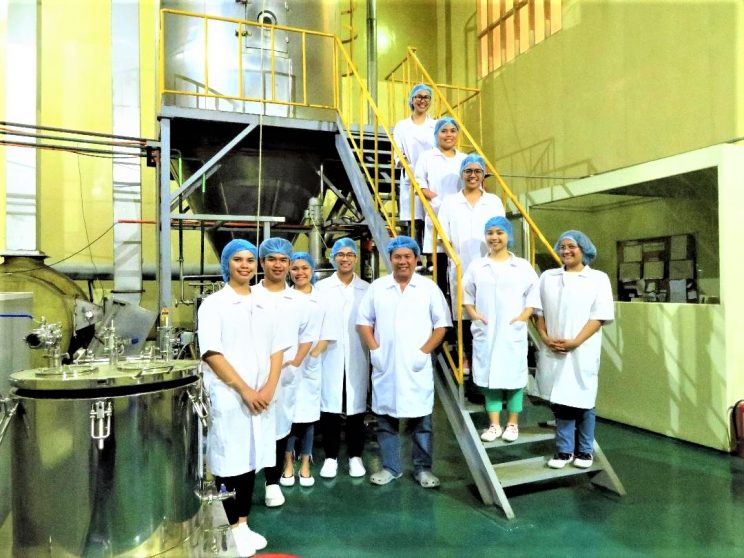
Cruz with his laboratory technicians.
The firm has not explored contract growing with local growers of their needed commodities. This approach may be considered by Cruz and his group, to attain the volume that they may need for extraction and for production of the products and by-products needed by other companies, specifically those from abroad.
Awards and recognition
Cruz had been recognized and awarded for his accomplishments as follows – Model Entrepreneur Award given by Metro Bacolod Chamber of Commerce in 2011.
In 2006, he was bestowed with The Ramon Magsaysay Memorial Award for Aquatic Technology Enterprise by DOST’s Philippine Council for Aquatic and Marine Resources Research and Development and in 2005, he was the recipient of The Outstanding Young Men (TOYM) Award by the JCI Philippines.
In 1997, he received the Most Outstanding Young Alumnus Award by the UPV. Cruz is currently the President of the Natural Products Society of the Philippines and an incoming Board of Trustee of the Foundation for the Philippine Environment. He is a Board of Director of the Natural Products Society of the Philippines.
With such accomplishments and accolades, there is no doubt that Cruz is a real and successful agripreneur in the fields of organic herbs, herbal extracts, and beauty and medicinal products.
Photos courtesy of Mr. Philip S. Cruz
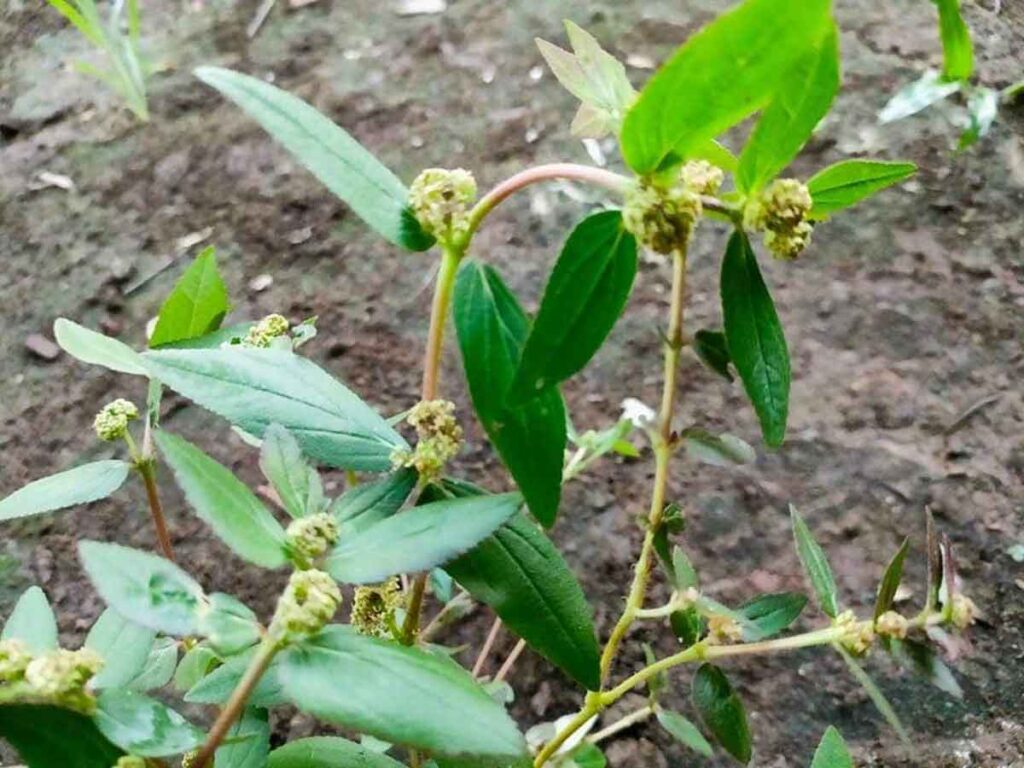
Padilla, a professor of Microbiology, is the principal investigator of the trial – a collaborative effort of UPV, Department of Science and Technology (DOST), Corazon Locsin Montelibano Memorial Regional Hospital in Bacolod City, Philippine Red Cross-Manila, and Quezon Institute.
“Ginatapos subong ang trial kon pwede gid man gamiton ang aton ginatawag herbal supplement nga tawa-tawa against COVID-19,” said Padilla over state-owned Radyo Pilipinas Iloilo.
The clinical trial started in late March this year.
Tawa-tawa, also known as “gatas-gatas,” is a hairy herb growing in open grasslands, roadsides and pathways.
Padilla said they were able to recruit over 100 COVID-19 patients in Negros Island for the trial but Red Cross-Manila and Quezon Institute were looking for more.
The trial may be completed by end of September this year.
“Aton i-analyze kon epektibo gid ini nga maka-relieve sang symptoms or maka-shorten sang quarantine stay (of COVID-19 patients),” said Padilla.
It would be a “breakthrough” if tawa-tawa is proven to alleviate symptoms of mild and moderate COVID-19. Padilla said it would lessen COVID-19 hospital admissions.
There are currently 10 clinical trials for COVID-19 itreatments in the Philippines, according to the Pharmaceutical Division of the Department of Health. These include the Favipiravir (Avigan), World Health Organization Trials for Treatments, Melatonin, Virgin Coconut Oil (VCO), Lagundi, Convalescent Plasma Therapy, Intravenous Tocilizumab, Anti-Coronavirus Therapies (ACT), and Evaluation of Plasma Therapy.
A national steering committee oversees the clinical trials./PN